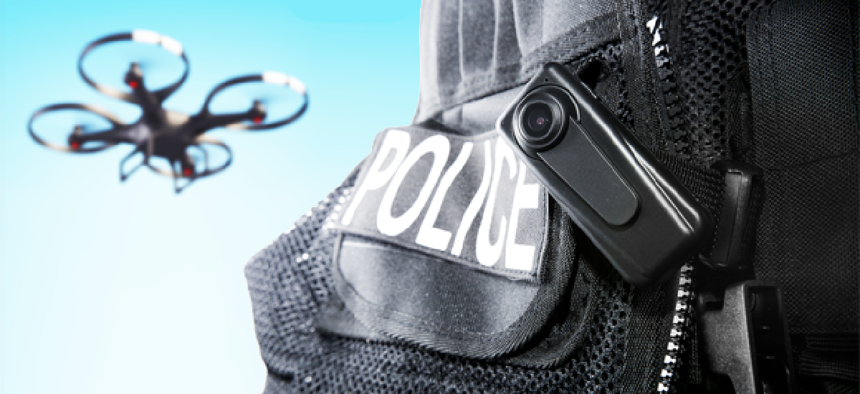Connecting state and local government leaders
While body-worn cameras and predictive policing solutions can improve law enforcement efficiency and transparency, concerns remain around the role of digital devices in solving community policing problems.
While body-worn cameras and predictive policing solutions are deployed to improve law enforcement efficiency and transparency, concerns remain around the role of digital devices in solving community policing problems.
The adoption of body-worn cameras (BWC) in police departments is intended to provide additional evidence and to hold officers accountable in a post-Ferguson world. Earlier this year, a study by the Major Cities Chiefs and the Major County Sheriffs found that 77 percent of major police departments said they were moving toward the implementation of BWCs.
These technologies are posing some new challenges, however, said Tracie Keesee, deputy commissioner of training for the New York City Police Department. Along with discussions around these devices -- how and when they are to be used and if they keep the public and officers safe -- Keesee said she is worried about officers deferring to a technology when human interaction may be more effective.
“The technology itself is still fairly new, when you think about policing technology as a whole,” Keesee said at a Nov. 30 New America event about the future of law enforcement technology.
Early on, some thought BWCs would be the solution to myriad problems, Keesee said. There are limitations to the technology, however -- as well as with the humans administering the technology and the policies behind what and how solutions are deployed. And questions remain as to whether a community where BWCs are deployed has full transparency or a say in what is being used.
“Trust is a human component, it’s not something technology can build for you,” Keesee said. “I think that we have to be very careful about how much we allow technology to leverage human interaction.”
In contrast, David Oh, councilman at-large for the Philadelphia City Council, said that where communities and police departments face limited resources and personnel, policing technology is helpful.
“Technology provides the opportunity for more objective, equitable and more fair treatment of people that are suspected of criminal activity,” he said at the event. Devices like BWCs and drones could fill some gaps and offer quality policing to the city’s poorest neighborhoods.
Oh is more concerned about inconsistency in police protocols and training, and the lack of transparency and shared best practices between communities with varying access to resources. “The technology, I don’t think is a problem,” he said. Technology offers the promise of transparency and standardized, uniform policing across the city, no matter the resources of the neighborhood.
If the police departments in one part of town deploy body cameras, then the other city departments should as well. Encouraging this kind of equity could address the lack of trust by improving all levels of service, Oh said. “The technology allows the opportunity to serve the community so those people who feel they’re not being served can now be served in a more efficient and appropriate manner,” he explained.
In Philadelphia, for example, officers are distributed throughout the city but are highly focused on homicide. This emphasis tends to push officers to communities with high crime, leaving other communities with fewer responders for burglaries, missing children, suspicious vehicles and vandalism.
With the help of drones and surveillance cameras, Oh said, those communities can be policed, even with fewer officers. Thermal detection technology can help search for missing children, and drones can be used to check out reports of fires or criminal activity before officers are sent, giving officials situational awareness to guide the deployment of personnel.
If video and BWC feeds are made public, the agency is being transparent and builds trust with the community. “Technology [offers] the opportunity to deal with people fairly and uniformly and give them the services at the end of the day,” he said.
And while Keesee said she is concerned that placing the responsibility of solving resource disparities on technology alone could reduce police department accountability, she does believe technology could improve police-community relations -- if transparency and device policies are handled beforehand. “Early versions of the body camera, the policy around the body camera, are those stepping stones we’re going to have to get through to get there.”
NEXT STORY: Congress gets up to speed on AI



